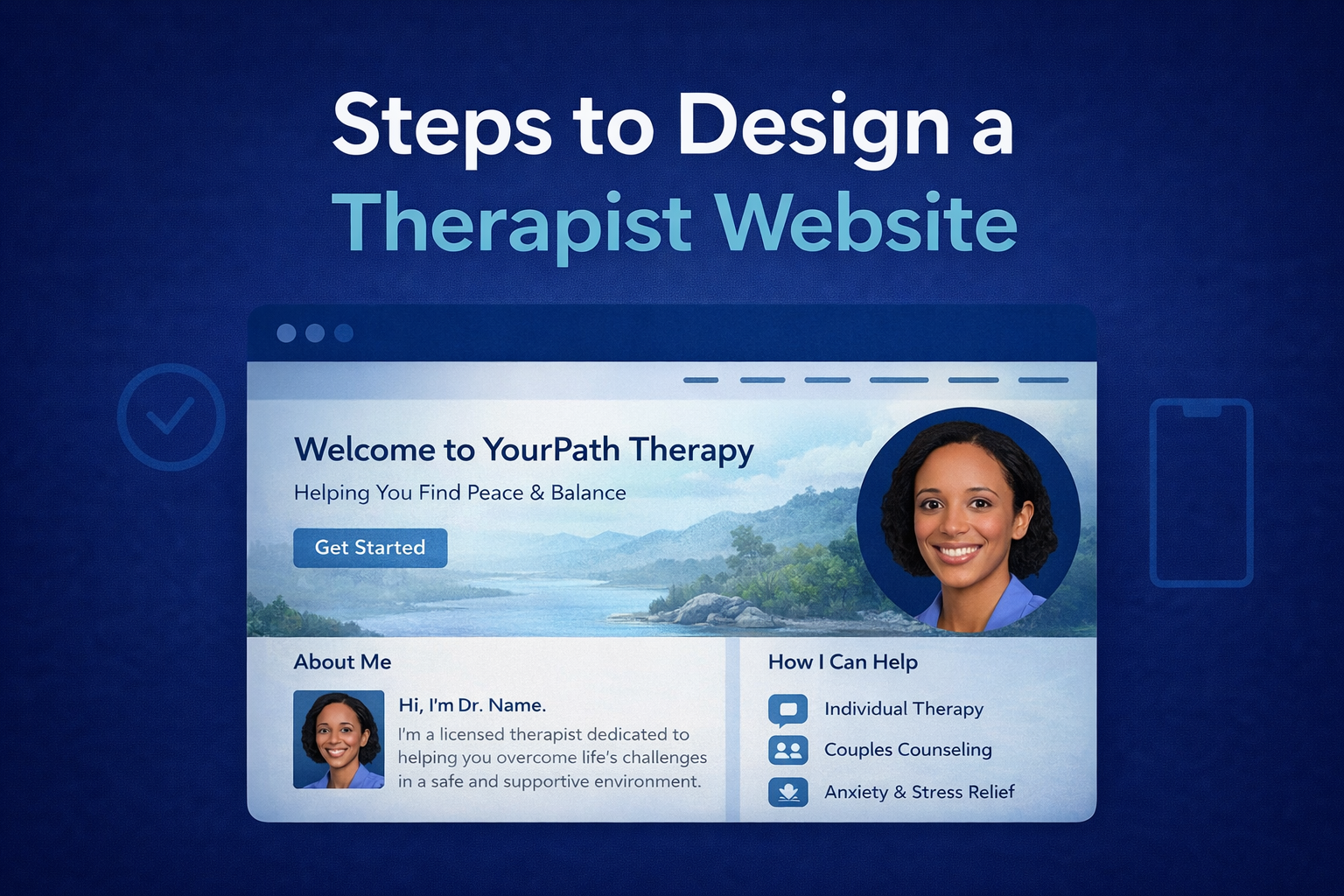In the rapidly evolving landscape of mental health care, secure applications have become indispensable tools for mental health professionals. These apps facilitate client management, teletherapy, documentation, and communication while ensuring compliance with stringent privacy regulations like the Health Insurance Portability and Accountability Act (HIPAA). With the increasing demand for digital solutions, mental health professionals need apps that prioritize security, usability, and clinical relevance to protect sensitive client information and enhance practice efficiency. This comprehensive guide explores the key features, benefits, and considerations for selecting secure apps for mental health professionals, along with practical recommendations and best practices.
Also Read: why seo is essential for therapists
Why Secure Apps Are Essential for Mental Health Professionals
Mental health professionals handle protected health information (PHI), such as client records, session notes, and treatment plans, which must be safeguarded under HIPAA and other regulations. Secure apps ensure that this sensitive data remains confidential, encrypted, and accessible only to authorized users. Beyond compliance, these apps streamline workflows, improve client engagement, and support the growing demand for teletherapy and remote care.
Key Benefits of Secure Apps
- Data Protection: Encrypts PHI to prevent unauthorized access or breaches.
- HIPAA Compliance: Ensures adherence to federal regulations, reducing legal risks.
- Improved Efficiency: Automates tasks like scheduling, billing, and documentation.
- Enhanced Client Experience: Offers secure communication and teletherapy options for convenient access to care.
- Scalability: Supports practice growth by integrating tools for solo practitioners or multi-provider clinics.
For insights on how digital solutions are transforming mental health care, see Digital Solutions for Mental Healthcare: Transforming Delivery of Care.
Key Features of Secure Apps for Mental Health Professionals
When selecting a secure app, mental health professionals should prioritize features that ensure compliance, usability, and functionality. Below are the critical components to look for:
1. HIPAA-Compliant Security
HIPAA compliance is non-negotiable for apps handling PHI. Key security features include:
- End-to-End Encryption: Protects data during transmission and storage.
- Business Associate Agreement (BAA): A contract with the app provider ensuring shared responsibility for PHI protection.
- Multi-Factor Authentication (MFA): Adds an extra layer of security for user access.
- Audit Logs: Tracks access and changes to PHI for compliance monitoring.
2. Teletherapy Capabilities
With the rise of remote counseling, secure apps should offer HIPAA-compliant video conferencing and messaging.
- Secure Video Platforms: Built-in or integrated teletherapy tools like Zoom for Healthcare or proprietary video systems.
- Secure Messaging: Encrypted chat features for client communication, as seen in apps like LedgerChat Health.
- Client Portals: Allow clients to schedule, pay, and communicate securely within the app.
3. Practice Management Tools
Efficient apps consolidate administrative tasks to save time and reduce errors.
- Scheduling: HIPAA-compliant appointment booking with automated reminders.
- Billing and Payments: Secure payment processing, such as IvyPay or SimplePractice Payments.
- Electronic Health Records (EHR): Secure storage for client notes, treatment plans, and progress tracking.
4. User-Friendly Interface
A well-designed app minimizes the learning curve and enhances usability for both professionals and clients.
- Intuitive Navigation: Simplifies access to features like client profiles, session logs, and billing.
- Cross-Platform Compatibility: Works seamlessly on desktops, tablets, and smartphones.
- Customizable Features: Allows tailoring to specific practice needs, such as personalized therapy exercises.
5. Integration with Other Tools
Seamless integration with existing systems improves workflow efficiency.
- EHR Integration: Syncs with platforms like TherapyNotes or SimplePractice for streamlined documentation.
- Analytics and Reporting: Tracks client progress and practice metrics for data-driven decisions.
- Third-Party Compatibility: Integrates with tools like Google Calendar or accounting software, provided they are HIPAA-compliant.
For more on teletherapy platforms, explore Teletherapy Platform Development: Comprehensive Guide to Building Effective Solutions.
Top Secure Apps for Mental Health Professionals
Below is a curated list of secure, HIPAA-compliant apps designed for mental health professionals, based on functionality, security, and user feedback:
1. SimplePractice
- Overview: A comprehensive practice management platform with EHR, telehealth, billing, and client portal features.
- Key Features:
- HIPAA-compliant video conferencing and messaging.
- Secure client intake forms and document storage.
- Integrated payment processing with IvyPay.
- Pricing: $29–$99/month, with a 30-day free trial.
- Best For: Solo practitioners and small practices seeking an all-in-one solution.
2. TherapyNotes
- Overview: A robust EHR platform with strong documentation and scheduling features.
- Key Features:
- HIPAA-compliant note-taking with customizable templates.
- Secure telehealth and client portal.
- Billing with insurance claim support.
- Pricing: $49–$59/month for solo practitioners; group pricing varies.
- Best For: Therapists needing advanced documentation and billing capabilities.
3. Doxy.me
- Overview: A teletherapy-focused platform with a simple interface and strong security.
- Key Features:
- HIPAA-compliant video conferencing with a BAA.
- No software downloads required for clients.
- Customizable waiting rooms for branding.
- Pricing: Free basic plan; premium plans start at $35/month.
- Best For: Therapists prioritizing affordable teletherapy solutions.
4. TheraPlatform
- Overview: An all-in-one platform for teletherapy, scheduling, and billing.
- Key Features:
- Secure video, messaging, and interactive whiteboard features.
- HIPAA-compliant forms and e-signatures.
- Integrated payment processing and insurance billing.
- Pricing: $39–$99/month, with a 30-day free trial.
- Best For: Practices needing interactive teletherapy tools.
5. Quenza
- Overview: A client engagement app for creating personalized therapy exercises and tracking progress.
- Key Features:
- HIPAA-compliant activity builder for customized interventions.
- Secure client tracking and analytics.
- Mobile app for clients to complete exercises on the go.
- Pricing: $49–$89/month.
- Best For: Therapists focused on client engagement and progress monitoring.
6. Hushmail
- Overview: A secure email and form solution tailored for healthcare professionals.
- Key Features:
- HIPAA-compliant email with encryption and BAA.
- Secure web forms for client intake.
- Integrates with teletherapy platforms.
- Pricing: $9.99/month for healthcare plans.
- Best For: Professionals needing secure communication tools.
For additional tools to enhance your practice, check out Top 10 Digital Tools Every Therapist Should Have in Their Practice.
Best Practices for Using Secure Apps
To maximize the benefits of secure apps while ensuring compliance, mental health professionals should follow these best practices:
- Verify HIPAA Compliance: Confirm the app provider offers a BAA and adheres to HIPAA’s Privacy and Security Rules.
- Enable Strong Security Measures: Use MFA, strong passwords, and device encryption to protect access to the app.
- Conduct Regular Training: Educate staff on HIPAA policies and app-specific security protocols to prevent breaches.
- Monitor Data Access: Regularly review audit logs to track who accesses PHI and ensure compliance.
- Update Software Regularly: Keep apps and devices updated to patch security vulnerabilities.
- Obtain Client Consent: Use secure forms to collect client authorization before sharing PHI, as required by HIPAA.
- Test App Usability: Pilot the app with a small group to ensure it meets practice and client needs before full adoption.
Common Pitfalls to Avoid
Mental health professionals must be cautious to avoid common mistakes when selecting and using secure apps:
- Using Non-Compliant Apps: Apps like Zoom (standard version), Skype, or Google Forms are not HIPAA-compliant without specific configurations.
- Neglecting BAAs: Failing to secure a BAA with the app provider can lead to HIPAA violations.
- Ignoring Privacy Policies: Ensure the app’s privacy policy protects client data and does not share it with third parties.
- Overlooking User Feedback: Choose apps with positive reviews from other mental health professionals to ensure reliability.
- Skipping Updates: Outdated apps are vulnerable to security breaches, so regular updates are critical.
How to Choose the Right Secure App
Selecting the right app requires balancing security, functionality, and cost. Consider the following steps:
- Assess Practice Needs: Identify whether you need teletherapy, EHR, billing, or client engagement features.
- Verify Security Credentials: Ensure the app is HIPAA-compliant, offers encryption, and provides a BAA.
- Evaluate Usability: Test the app’s interface and ensure it’s intuitive for both you and your clients.
- Check Integration: Confirm compatibility with existing tools like EHRs or payment systems.
- Compare Costs: Balance features with pricing, considering free trials or scalable plans for future growth.
- Review Credibility: Use resources like the American Psychiatric Association’s App Advisor to evaluate apps for clinical relevance and security.
For guidance on building a secure online presence, read Website Design for Therapists: Key Elements to Build a Professional, Engaging Site.
Costs of Secure Apps for Mental Health Professionals
The cost of secure apps varies based on features and practice size. Here’s a breakdown:
- Free Plans: Doxy.me offers a free teletherapy plan with basic features.
- Subscription-Based: SimplePractice ($29–$99/month), TherapyNotes ($49–$59/month), TheraPlatform ($39–$99/month), Quenza ($49–$89/month).
- Per-Transaction Fees: Payment processors like IvyPay charge 2.75% per transaction.
- Custom Solutions: Developing a custom app can cost $10,000–$50,000, depending on complexity.
Investing in a secure app is a long-term strategy to protect client data and streamline operations, with many providers offering free trials to test functionality.
Marketing Your Practice with Secure Apps
Secure apps can also support marketing efforts by enhancing client engagement and trust:
- Client Portals: Apps like KnackHQ offer custom portals for client profiles, goal tracking, and document uploads, improving client retention.
- SEO and Content Integration: Share de-identified client success stories or mental health resources via the app’s blog or newsletter features, ensuring HIPAA compliance.
- Social Media Promotion: Link to your app’s secure client portal in social media bios, avoiding PHI sharing.
- Email Campaigns: Use HIPAA-compliant email tools like Hushmail for secure outreach to prospective clients.
For more marketing strategies, see How to Market Yourself as a Therapist: Comprehensive Guide to Growing Your Practice.
Conclusion
Secure apps are vital for mental health professionals to deliver safe, efficient, and compliant care in the digital age. By prioritizing HIPAA-compliant features like encryption, BAAs, and secure teletherapy, these apps protect client privacy while streamlining practice management. Platforms like SimplePractice, TherapyNotes, and Doxy.me offer robust solutions tailored to therapists’ needs, while best practices like regular updates and staff training ensure ongoing compliance. Choosing the right app involves assessing practice needs, verifying security credentials, and testing usability to ensure a seamless experience for both professionals and clients.
For expert assistance in selecting or implementing secure apps for your mental health practice, visit Mental Health IT Solutions.







